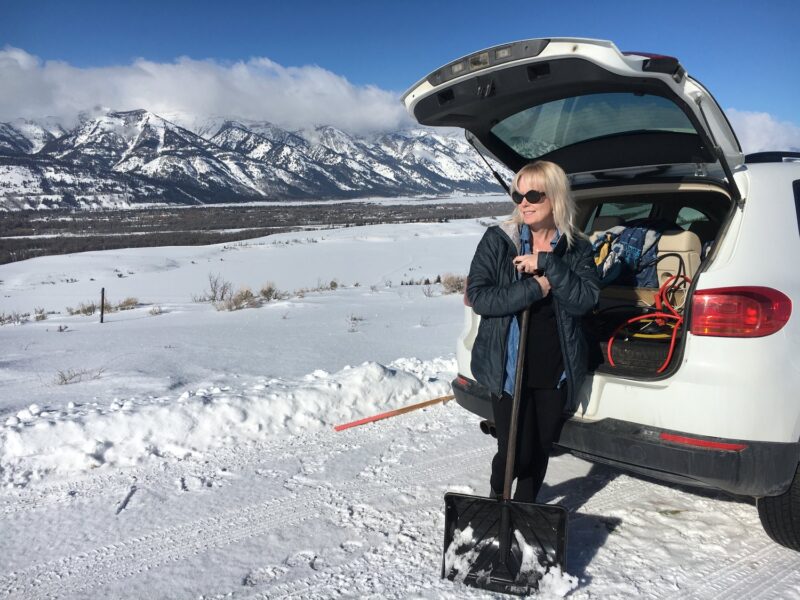Making It Work: Jackson Office Manager Finds Relief From High Housing Costs
She’s been commuting to work from Idaho for eight years
- Published In: Other News & Features
- Last Updated: Jan 27, 2022

Lynette Thalin, 47, shows the route she drives into Jackson each weekday from her home near Driggs, Idaho, to work as office manager at Teton Psychiatry. She commutes 40 miles each way because she cannot find affordable housing in Jackson. (Photo by Alex Bontecou for the Wyoming Truth)
By Madeline Thulin
Special to the Wyoming Truth
Lynette Thalin presses her foot on the gas pedal, gaining 1,692 feet in elevation as she makes her daily commute over Teton Pass from her home near Driggs, Idaho. The winding and steep gradient results in a beautiful view from the top of the pass at 8,373 feet overlooking the valley of Jackson Hole.
But Thalin isn’t driving to Jackson to witness spectacular views; she is making her daily weekday commute of 40 miles each way in her Volkswagen Tiguan to work at Teton Psychiatry as an office manager. It’s a trek she has been making since 2013 because she has never been able to afford housing in Jackson despite continually working there.
The 47-year-old mother of three is not alone in her need to commute into Jackson. She is among an estimated 10,000 people who commute over the Teton Pass or drive through an equally treacherous Snake River, according to a 2020 report by the Wyoming Department of Administration and Information. The skyrocketing price of the housing and rental market is typically to blame.

Housing in Teton County has been unaffordable for the working class for more than three decades, and home prices are now reaching record highs even as wages are not keeping pace, according to the Jackson and Teton County Annual Housing Supply Plan, a five-year housing plan for Teton County. A 2020 report by Wyoming’s Administration and Information found similarly that housing in Teton County was 124% higher than the average cost of housing throughout the state.
Thalin has worked at Teton Psychiatry for eight years, managing patient intake, billing, insurance clearance, scheduling and records. While her commute takes at least 45 minutes in the summer, she said it is worth it to have a higher salary. Thalin’s household income is less than $50,000 annually, but she said jobs pay more in Jackson than those near where she lives.
“I wish that I didn’t have to deal with [the commute], but it is my only option,” Thalin said.
Her employer has helped, too, she said, by making certain concessions. For example, her boss gave her a laptop computer this winter so Thalin can work from home if the weather gets bad and closes the Teton Pass. This means Thalin isn’t forced to take paid leave when the roads are too dangerous or risk a car accident in the winter traveling to work.
The price of commuting is not insignificant for workers in Jackson. Thalin said she spends $250 on gas each month plus more money on the upkeep of her car. She also has noticed that as more people opt to live in areas surrounding Jackson, the cost of housing in those communities is increasing.
Thalin said that she first moved to Idaho as a teenager in 1992, and she has watched Driggs transform from “a town with only a post office, a grocery store and a hardware store and slowly grow [to a place where] the cost of living prohibits working-class people to fulfill the necessary workforce to provide services.”
Thalin was drawn to the area between Victor (population 2,979) and Driggs, Idaho, (population 1,867) because of her family. She and her 18-year-old son Morgan were able to find a pre-built 1,200-square-foot home with three bedrooms and two bathrooms and move it to her parents’ property there. Her parents provide a support system to her and her son after her divorce from a marriage that lasted 10 years.
Before Thalin built the house and moved it to her parents’ property, she looked at other housing options, but they all were out of reach for her financially. Thalin said she was shocked to find that “a fixer-up was way out of my price range” and “even manufactured homes were sold for $400,000 to $500,000.”
Thalin said it cost her less than $130,000 to buy the house, deliver it to her parents’ property and obtain all the necessary permits.
“People are desperate for housing,” Thalin said, adding that “something has got to be done.”
Thalin said she feels “extremely fortunate” now that she has a home of her own and doesn’t take for granted that she can put her payments toward a mortgage rather than rent. Eventually, when it is more economical, she wants to work on home improvement projects, such as building a garage.
Still, the housing prices trouble Thalin.
“It is sad when I think about all of the money I wasted in rent since moving back home in the winter of 2020,” she said, adding that she probably could have bought “half a house” with what she spent in rent all those years.













